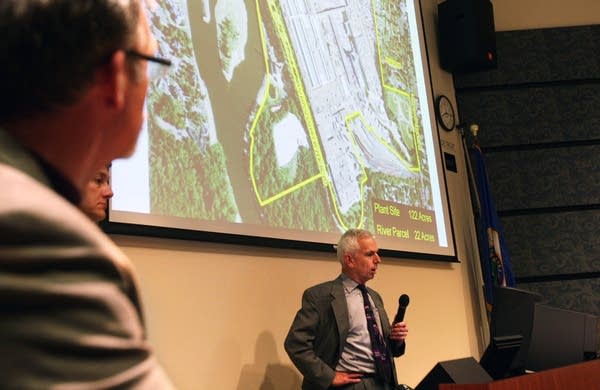Ford outlines plans for demolition of Twin Cities plant

After the last Ranger pickup truck rolls off the line at the Twin Cities Assembly Plant in St. Paul on Dec. 16, the Ford Motor Co. begins the long process of getting the site ready for sale. At a public meeting Wednesday night, company officials said equipment will be hauled off beginning early next year, with demolition of the buildings to follow.
An environmental assessment and cleanup will likely take several years, and only then can the site be redeveloped. But city officials and neighborhood residents say time is on their side.
After 86 years of heavy manufacturing -- starting decades before the EPA was even a gleam in anyone's eye -- there's no telling exactly what's buried underneath the Twin Cities Assembly Plant. But Roger Gaudette, Ford's director of asset management, says a preliminary look has found nothing too surprising for a factory of this vintage -- mainly underground storage tanks.
"Typically it's gasoline," he said. "We have to use gasoline to fill the vehicles up. Some of the old ones had process materials, whether it's lubricants and gasoline, those types of things."
Create a More Connected Minnesota
MPR News is your trusted resource for the news you need. With your support, MPR News brings accessible, courageous journalism and authentic conversation to everyone - free of paywalls and barriers. Your gift makes a difference.
Ford is aiming to complete its environmental assessment by mid 2013. But Gaudette said it's still too early to tell how long the actual cleanup might take. But that uncertainty isn't stopping civic leaders and residents of the Highland Park neighborhood from thinking about opportunities for the 135 acres of prime riverfront property.
In 2007, as political leaders fought to delay the plant's closure, a community task force drew up concepts for the site's redevelopment, including new industry, housing and retail.
St. Paul Planning and Economic Development Director Cecile Bedor said the job losses at Ford are unfortunate, but there's a major chance for St. Paul to do something innovative and ambitious.
"What it does present is a really exciting opportunity to really realize a beautiful development that's going to add to this community and the region," Bedor said. "And really, our hope is to showcase how to do really good development."
Bedor said city planners are working closely with Ford to find a developer that will respect the character of the residential Highland Park neighborhood that grew up around the plant. That's a big concern for Highland District Councilmember Shawn Bartsh.
"Whatever goes into the Ford plant needs to fit within the community that now is established. This isn't 1921 anymore," Bartsh said. "The Ford plant was unique in that it was one large business. It could control what went in, what went out, the traffic. And anyone who's been to Highland knows that traffic and parking are huge concerns. So whatever development goes in to the Ford plant, has to be tempered with the realities of traffic and parking."
Still, Bartsh said she's excited about the potential for the site. She said the housing market in Highland Park remains strong despite the economy, and swapping the plant for new homes would be ideal. But Bartsh and everyone else close to the redevelopment process know it will not be quick.
That's certainly been the case in other communities that have lost big auto plants in the last few years.
A factory that made Ford Explorers in Hazelwood, Mo., closed in 2006. It was sold and torn down, but five years later the site near St. Louis remains mostly empty. Hazelwood economic development director David Cox said the bad economy has delayed plans for an industrial park.
"It's a very slow process. And with the national economy and the regional competition that already exists, it'll probably be a little while," he said. "So I'd recommend being patient for any development that size."
St. Paul city officials said they have no problem being patient. Development director Bedor said it will take years to tear down, clean up and redesign the old Ford site. And when that's done, the economy may have caught up with the ambitions of the city and neighborhood.

